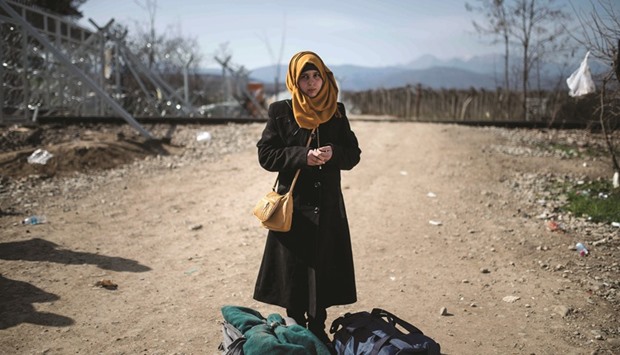Greece raged at neighbours and began bussing hundreds of migrants back from its northern border yesterday, fearing that it could be inundated with migrants halted by Balkan states trying to shut the main land route to Western Europe.
Athens filed a rare diplomatic protest with fellow EU member Austria for excluding Greek officials from a high-level meeting on measures aimed at curbing Europe’s biggest inward migration since World War II.
More than a million migrants and refugees passed through Greece last year, and nearly 100,000 have already arrived this year.
Nearly all reached Greece by sea and travelled onward by land over the Balkan peninsula to richer EU countries further north and west, above all Germany.
But several of the countries along that route have been taking measures to close their frontiers, prompting those further down the chain to impose similar restrictions to prevent a bottleneck.
Greek police removed migrants from the Greek-Macedonian border yesterday after additional passage restrictions imposed by Macedonian authorities left hundreds of people, mainly Afghans, stuck at the border.
About 450 of them were loaded onto buses to be taken to reception centres in Athens, joining hundreds more fresh arrivals from outlying Greek islands who arrived on the Greek mainland yesterday morning.
“I will continue on to Macedonia,” said Abdulah Farash, 21, a student from Syria.
“My friend and I want to go on to Germany ... it was important to reach Greece through Izmir,” he said of a Turkish Aegean port where many migrants set off for the passage to Greece. “Then things are easy.”
At the border with Macedonia on Monday, witnesses said that Syrian refugees who did not have all the necessary travel documents, including passports, were turned back.
European countries are trying to slow the migration wave, which includes hundreds of thousands of refugees from Syria and other war zones, as well as large numbers of other migrants from north Africa, Central Asia and the Middle East.
Austria is due to host west Balkan states today to discuss efforts to manage and curb the flow, but did not invite Greece.
In unusually heated language that shows how the migration crisis has raised passions across Europe, Greek Foreign Minister Nikos Kotzias described the snub as a “unilateral and non-friendly act”.
“The exclusion of our country at this meeting is seen as a non-friendly act since it gives the impression that some, in our absence, are expediting decisions which directly concern us.”
Greece also accused its old foe Turkey of trying to “blow apart” an agreement that Nato would help patrol the porous sea border between Greece and Turkey to clamp down on human trafficking.
Turkey, which is hosting 2.5mn Syrian refugees, the largest refugee population on earth, says it is trying to stop them from sailing for Greece but needs more aid.
Greece, still labouring under a financial crisis that has wrecked living standards at home, says it would not be able to cope with the influx on its own, if the onward passage of migrants through the Balkans is halted.
It says it cannot turn back thousands of people arriving on its shores daily in inflatable dinghies, citing international conventions.
Austria, the last country on the overland route to Germany, said last week it had imposed a daily limit of 3,200 migrants passing through, and 80 asylum claims.
Further down, Hungary has said it would shut three railway crossings with Croatia used by migrants, effective from February 22.
Slovenia has erected a fence on its southern border with Croatia to ensure that migrants can enter only through official border crossings.
“The Balkan route was a humanitarian corridor. It could close after consultations and not by turning one country against the other,” Greek Migration Minister Yannis Mouzalas told Skai TV. “We are faced with an action that has elements of a coup.”
Vienna denied it had snubbed Athens by excluding it from today’s talks.
The meeting of West Balkan nations was an established format which had first convened in Austria last year to discuss the issue of Islamist militants, a foreign ministry spokesman said.
The meeting includes interior and foreign ministers from Albania, Bosnia, Bulgaria, Kosovo, Croatia, Macedonia, Montenegro, Serbia and Slovenia.

A young migrant stands with her bags after crossing the Greek-Macedonian border near Gevgelija town.
